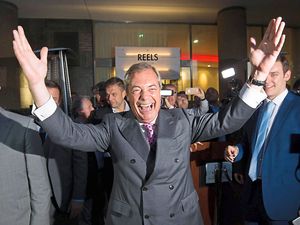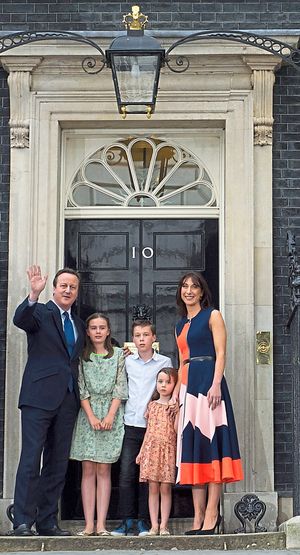Brexit referendum five years on: The vote that changed our country
When Nigel Farage uttered the words "the dawn is breaking on an independent United Kingdom", he probably didn't foresee the myriad problems that lay ahead.

The then Ukip leader contributed more than most to Britain's departure from the EU, and for Eurosceptics across the country his triumphant speech of five years ago seemed like a watershed moment.
For the likes of Mr Farage and Vote Leave heavyweight Boris Johnson, stage one was complete and it was now down to the politicians to do their duty and forge a deal with the EU that could pass through the Commons.
No one could have predicted that it would take 60 truly miserable months for the shackles imposed by Brussels to finally be cast aside.
Months characterised by political infighting as parties fell apart and Parliament became impotent; 'Project Fear' scare stories predicting the imminent collapse of the UK's economy; court battles and protest marches as people snubbed their noses at democracy.
Families, like politicians, split into warring camps of 'Leavers' and 'Remainers'. Michel Barnier and Jean-Claude Juncker became household names, albeit ones that were often followed with a string of expletives.
As it turned out, winning the referendum had been the easy bit for Brexiteers, who defied the odds to get home by a margin of 1,269,241 votes.
It wasn't until the end of January 2020 that, after MPs had ratified the withdrawal agreement by a majority of 80, Britain finally departed the EU.
It had been one heck of a journey to get there, involving two general elections and leadership battles for both Labour and the Tories.

David Cameron, the bloke who started it all because he could not possibly countenance a Leave victory, immediately quit as PM and rather fittingly disappeared off to France.
Mr Johnson, who famously jumped on the side of Leave after briefly considering Remain, ended up in Number 10 via Theresa May's wild ride in the hotseat, which had seen Brexit caught up in a series of Westminster logjams.
In the most turbulent period in politics in modern times, reputations were destroyed and made.
Five years down the line, only now are we starting to get a picture of what the new global Britain of the future is likely to look like.
There's still a pandemic to get through, of course, but trade deals are being struck new legislation put before the Commons in a bid to ensure that as Mr Johnson has repeatedly promised, the whole country feels the benefit of Brexit.
North Shropshire MP Owen Paterson, a long standing Eurosceptic who campaigned for Brexit, said despite some teething troubles he still expected the UK to make a success outside the EU.
He said: "I am still very optimistic, as long as we take full advantage of the opportunities we have.
"The most screaming black and white monster advantage we have seen so far is because we were not involved in the European decision on vaccines the Government took a major punt on private suppliers developing vaccines, they developed them extremely quickly and in partnership with the distribution system of the NHS it has been a huge success.
"It means we should come out of lockdown quicker than most other countries, which could add about £60 billion to the UK economy.
"I cannot think of a more brilliant example of how we have used our new independence to the advantage of millions of citizens."
Reflecting on the period since the referendum, he added: "I am amazed at how the establishment fought for five years to bitterly resist what the British people voted for.
"Now looking at people attacking me on Twitter and I think it is extraordinary, they do not want Britain to succeed."
Telford MP Lucy Allan said the country was now beginning to embrace the opportunities provided by Brexit.
"Bespoke new trade deals with countries around the world, tailored to our needs, will create opportunities for businesses across the country," she said.
"The Australian trade deal is the first of many new and ambitious agreements – the Government already having rolled over our other trade deals signed whilst a member of the EU.
"Of course, there remain a number of outstanding issues to be resolved between the UK and the EU – particularly regarding trade across the Northern Irish border.
"The European Commission’s attempt to unilaterally suspend the protocol to prevent Oxford-AstraZeneca vaccines entering the UK was ill-advised, and rightly the decision was quickly reversed.
"The freedom to push ahead with the UK’s successful vaccine programme was one clear advantage of leaving the European Medicines Agency and showed that nation states work quickly and efficiently when free of regulation, collective decision making and other political considerations.
"Both parties are engaging constructively over the Northern Ireland border, although the UK has rightly voiced its concerns at EU intransigence.
"The deal signed envisioned a respectful and balanced approach to the protocol and it is the view of the UK Government that the EU is being deliberately overzealous in its interpretation of the deal. Of course, the protocol is subject to a vote in the Northern Ireland Assembly every four years, and if it cannot command a simple majority, the arrangements will cease.
"I believe this political pressure will lead to a favourable resolution for all parties."
Ms Allan said the relatively smooth progress of Brexit since the withdrawal agreement was signed off in early 2020 would have been replaced by "chaos" had Labour won the 2019 general election and initiated plans for a second referendum.
She added: "Delivering Brexit has taken longer than anyone could have envisaged, due to the opposition of those who would not accept the decision of the British people, but we can now look forward to a dynamic new future for the Country outside the EU."
If recent events are anything to go by, it may take some time yet for a strong bond to develop between Britain and the EU.
A row has escalated over the Northern Ireland protocol. Farmers and fishermen say the post-Brexit trade deal has shafted them, while fears abound that a trade war is brewing over sausages, of all things.
In a further portent of hostilities to come, EU bosses are even planning to cut the amount of British television and film shown in Europe, presumably meaning there will be less 'Allo 'Allo! reruns shown in France.
The future may be uncertain, but one thing is for sure.
Go back five years and ahead of the referendum, Star readers knew the score.
In a poll in March 2016, 80 per cent of respondents backed a departure from the EU, and tellingly, Mr Johnson was named as the politician most likely to influence their decision.





